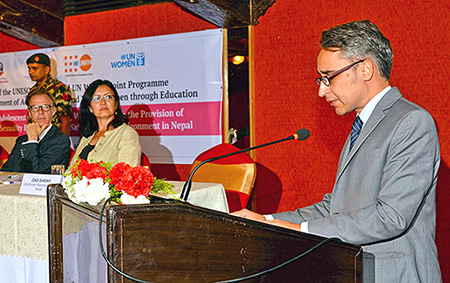Launch of the UNESCO-UN Women-UNFPA Joint Programme
Date:
Remarks by Ziad Sheikh, UN Women Representative for Launch of the UNESCO-UN Women-UNFPA Joint Programme at Hotel Annapurna, Kathmandu, Nepal.

His Excellency, the Honourable Minister of Education,
Mr. Giriraj Mani Pokharel
Ms Irina Bokova, Director-General of UNESCO
Mr Bishwa Prakash Pandit, Secretary, Ministry of Education
Mr Hyungkyoo Kim, Country Director,
Government Officials, Colleagues from the UNDistinguished Guests, Ladies and GentlemenGood evening and Namaste
This joint programme could not be more timely and its design more apt. It comes as Nepal seeks to build on the impressive development gains it achieved under its Millennium Development Goals and it comes shortly after the world adopted Agenda 2030 and the SDGs, committing to leave no one behind. The design recognizes the integrated and cross-sectoral approach we must take to help bring about lasting positive changes in people’s lives. And it recognizes the power of partnerships, that working together – bringing together our collective skills, expertise and experience – we can achieve more.
On behalf of UN Women, I would like to thank the Ministry of Education for its leadership and partnership of the Joint Programme in Nepal. I would like to thank the Director General of UNESCO, Madam Irina Bokova, for her global leadership in spearheading this joint UN initiative. And I would also like to thank KOICA for its generous support, enabling us to start the programme here in Nepal.
The Government of Nepal has consistently strengthened its commitments to promoting and protecting the rights of women and girls, recognizing that no enduring solution to the challenges of our day – from climate change to economic growth to ending poverty—can be solved without the full participation of half its population. The joint programme we launch today echoes these commitments by empowering adolescent girls and young women through education: empowered to make informed decisions about their lives and empowered to travel a path of greater opportunities.
Indeed, education is powerful. It also brings great promise. While primary school enrollment rates for girls are encouraging, there also need to be opportunities and options for them to go higher – as high as they wish. And as efforts are strengthened to ensure quality and safe education for all, at all levels, there need to be complementary efforts to promote women’s economic empowerment. Global experience shows that an increase in female labour force participation leads to faster economic growth. Expanding the economic capabilities of young women can lead to higher incomes, access and control over resources, and greater security, including protection from violence.
Through the joint programme, UN Women will support out-of-school adolescent girls and young women with technical and vocational education and training, building on our existing partnerships and experience with networks of excluded women. This support will help young women take the power of their education and contribute to the promise of their country’s development.
The extensive partnerships we see here this evening are a testimony to the fundamental importance of education. And the joint programme recognizes the critical importance of education to women’s empowerment. UN Women is committed to working with you to ensure its success.
Thank you.